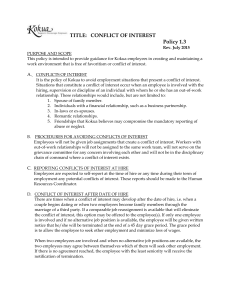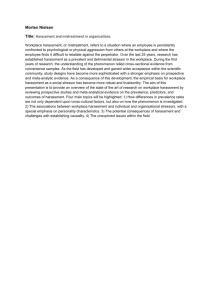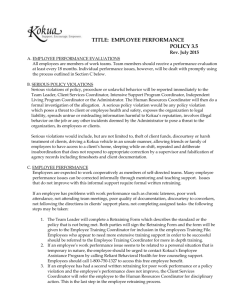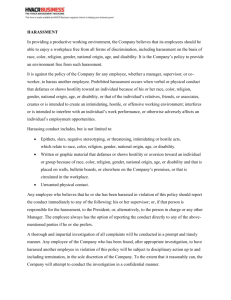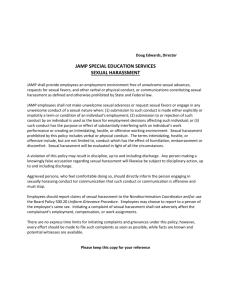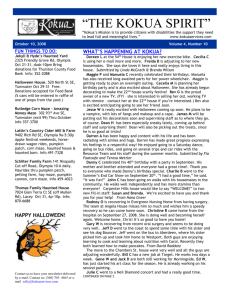Policy 3.2: Employee Conduct
advertisement
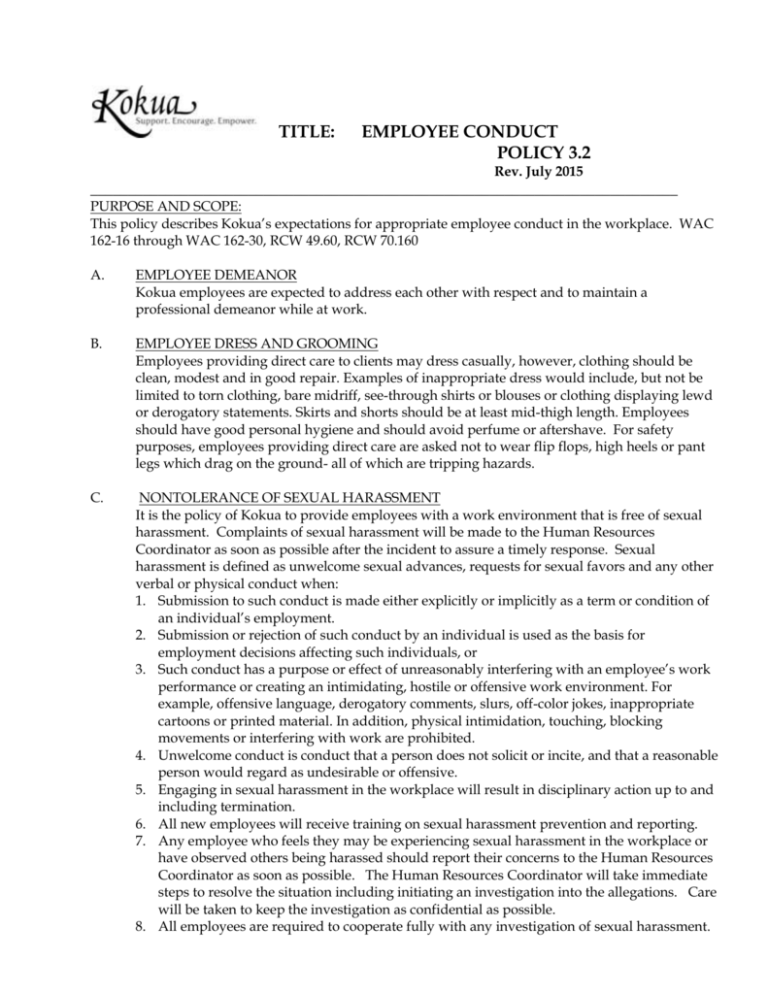
TITLE: EMPLOYEE CONDUCT POLICY 3.2 Rev. July 2015 ______________________________________________________________________________ PURPOSE AND SCOPE: This policy describes Kokua’s expectations for appropriate employee conduct in the workplace. WAC 162-16 through WAC 162-30, RCW 49.60, RCW 70.160 A. EMPLOYEE DEMEANOR Kokua employees are expected to address each other with respect and to maintain a professional demeanor while at work. B. EMPLOYEE DRESS AND GROOMING Employees providing direct care to clients may dress casually, however, clothing should be clean, modest and in good repair. Examples of inappropriate dress would include, but not be limited to torn clothing, bare midriff, see-through shirts or blouses or clothing displaying lewd or derogatory statements. Skirts and shorts should be at least mid-thigh length. Employees should have good personal hygiene and should avoid perfume or aftershave. For safety purposes, employees providing direct care are asked not to wear flip flops, high heels or pant legs which drag on the ground- all of which are tripping hazards. C. NONTOLERANCE OF SEXUAL HARASSMENT It is the policy of Kokua to provide employees with a work environment that is free of sexual harassment. Complaints of sexual harassment will be made to the Human Resources Coordinator as soon as possible after the incident to assure a timely response. Sexual harassment is defined as unwelcome sexual advances, requests for sexual favors and any other verbal or physical conduct when: 1. Submission to such conduct is made either explicitly or implicitly as a term or condition of an individual’s employment. 2. Submission or rejection of such conduct by an individual is used as the basis for employment decisions affecting such individuals, or 3. Such conduct has a purpose or effect of unreasonably interfering with an employee’s work performance or creating an intimidating, hostile or offensive work environment. For example, offensive language, derogatory comments, slurs, off-color jokes, inappropriate cartoons or printed material. In addition, physical intimidation, touching, blocking movements or interfering with work are prohibited. 4. Unwelcome conduct is conduct that a person does not solicit or incite, and that a reasonable person would regard as undesirable or offensive. 5. Engaging in sexual harassment in the workplace will result in disciplinary action up to and including termination. 6. All new employees will receive training on sexual harassment prevention and reporting. 7. Any employee who feels they may be experiencing sexual harassment in the workplace or have observed others being harassed should report their concerns to the Human Resources Coordinator as soon as possible. The Human Resources Coordinator will take immediate steps to resolve the situation including initiating an investigation into the allegations. Care will be taken to keep the investigation as confidential as possible. 8. All employees are required to cooperate fully with any investigation of sexual harassment. 9. Retaliation against a complaint of any kind is prohibited. 10. Employees found to have willfully and falsely accused or made false statements will be subject to disciplinary action. 11. The Human Resources Coordinator will report the results of the investigation to the complainant and will outline the steps to be taken to assure the harassment is effectively stopped. 12. Any complaints of sexual harassment made against the Administrator or the Development Coordinator are to be reported to the Board. The Board will take immediate steps to resolve the situation, including initiating an investigation. D. ALCOHOL AND DRUGS Kokua is committed to maintaining a safe working environment both for clients and for employees. Having a workforce with non-impaired workers is the top priority. Any employee whose job position includes direct client care or operation of a motor vehicle must notify the Human Resources Coordinator when taking any medication that may impair job performance. If possible, a temporary light duty assignment may be provided. Employees who drink alcohol or use drugs on the job or come to work under the influence of alcohol or drugs will face disciplinary action, up to and including termination. Any employee who suspects that a co-worker is under the influence of alcohol or drugs while at work should use the Kokua On-Call System to notify management of the issue. If there is reasonable cause to suspect that the employee is under the influence of alcohol or drugs while at work, the supervisor responding to the incident shall require the employee to leave the workplace and may require the employee to complete drug or alcohol testing at a laboratory chosen by Kokua. When an employee is required to undergo drug and alcohol testing, the employee will be driven to and from the testing facility by a Kokua supervisor. Employees may be suspended without pay awaiting the results of testing. Any employee who refuses the testing process or is found to have tampered with the testing process will be terminated. E. SMOKING AREAS Employees are not permitted to smoke in the Kokua office or Kokua vehicles. Employees at the office must be 25 feet away from all office doors when smoking. All cigarette butts must be discarded in the designated receptacles for safety. Employees are not permitted to smoke in the clients’ homes or garages. When possible Try to observe the 25 foot guideline unless it compromises client health and safety to do so, for example, if clients need to be visually monitored for safety Whenever possible, smoke in the back yard or in an area where you are not in full view of the neighbors Employees are not permitted to smoke along with clients, but must smoke during their break periods All cigarette butts must be discarded in designated receptacles for safety. F. PERSONAL MEALS AND DRINKS Employees are not allowed to eat any food purchased by the clients. Employees are to bring their own food and non-alcoholic drinks. Meal preparation should be kept to a minimum. Food should not be exchanged between staff and clients. The only exception to this rule would be when a client or clients host(s) a party to which staff persons have been invited and where food is served. G. GIFTS Gifts should not be accepted from clients. The giving of gifts to clients is discouraged but may be appropriate at Christmas or birthdays. All gifts given should indicate “from the Staff” not from any individual. All donations to clients are made anonymously. Donations for clients should be brought to the Kokua office. Office staff will arrange for the client(s) to receive the donated articles. A receipt may be given to the donor for tax purposes. H. CLIENT TELEPHONE The telephones in the homes belong to the clients, and they are billed for the phone service. Clients should be encouraged to answer when it rings. The client’s feelings of ownership should be foremost in the employee’s mind. DDA does not pay for client’s long distance phone calls. These costs are paid for by the client. Long distance telephone charges should be paid by the client who made the call. Telephones are not for staff personal use. Employees are permitted to use the clients’ phone for personal calls only in an emergency, and the employee should always obtain the client’s permission first. On rare occasions when the phone is used by staff, a limit of two minutes should be observed. Employees should not give out the client’s phone number to relatives, friends or businesses. Use the office phone as your work phone. Office staff will relay messages received on your behalf. If staff must make an emergency personal call that is long distance, the employee must bill the calls to their own phone or reverse the charges. I. PERSONAL CELL PHONES Personal cell phones should be turned off during work time. Cell phone messages may be checked during break time. The answering of private cell phone calls should be done outside the client’s home. It is important that employees’ needs not intrude on the client’s personal space. The only exception to this requirement is for supervisory staff persons who need to contact each other when they are working in the field. J. PERSONAL PROPERTY IN THE WORKPLACE Employees are not to bring personal belongings to the workplace other than their meal and needed personal care products. This includes, but is not limited to, personal computers, gaming devices, CD’s, videos, musical instruments or pets. During their work shift, client needs must be the primary focus of attention. The only exception to this rule would be a graveyard staff person who brought a book or a device to help them remain alert and awake while the clients are sleeping. The book or the device should never be used when a client is awake. K. SCHEDULED SHIFTS All employees are expected to come to work on time and to work their entire shift. If a shift cannot be worked due to illness or family emergency, the employee will give the Team Leader or On-Call person as much advance notice as possible. It is the responsibility of the employee to find their own replacement if a shift cannot be filled. Employees finding other employees to work for them are responsible to have a Temporary Schedule Change Form filled out completely and approved in writing by the Team Leader. In emergencies the Team Leader may assist in finding replacement workers. After the “Temporary Schedule Change Form” has been signed by both parties, the employee agreeing to work then becomes the responsible party to insure the shift is filled. If employees are not able to come to work to sign the “Temporary Schedule Change Form, both employees must call the office so that office personnel can witness the agreement and complete the schedule change form on their behalf. Repeated failure to follow this procedure may result in disciplinary action. L. RELIGION Kokua is a non-profit agency with no religious affiliation. Staff may not initiate personal prayer with clients. Proselytizing or teaching any specific denominational doctrine to clients is prohibited. Clients are free to participate in church services of their choosing. Employees may be required to assist clients to attend church services and church activities. M. RELATIONSHIPS WITH CLIENTS The relationship between a staff person and a client is a professional one. The staff person’s actions must always be motivated by the client’s best interests. The staff/client relationship should be characterized by trust, respect and good will. It is important to recognize that this intimacy does not equate to friendship. Staff should be cautioned not to treat clients as part of the staff person’s family. When staff turnover occurs, the accumulated loss can be devastating to the client. Staff persons are discouraged from taking clients to their home. It is the responsibility of staff to help the clients to form lasting, nonpaid relationships with other community members. N. VOLUNTEERS Any non-employee who would like to donate time or services in benefit of the clients should contact the office to seek formal volunteer status. Volunteers are required to fill out an application form, a confidentiality statement and a criminal background application form. Background checks should be renewed on the same schedule as those for regular employees. Kokua Policy 3.2: EMPLOYEE CONDUCT Attachment A Code of Ethics This code of conduct is intended to serve as a guide for all employees, interns and volunteers in resolving ethical dilemmas that may arise in the workplace. By upholding these guidelines, Kokua intends to foster a climate of mutual respect and continuing personal growth for our clients, our employees and volunteers. Respect Treat coworkers and clients with respect. Avoid gossip and other forms of negative communication which erode trust and cause others pain. Diversity Uphold the right of others to think, to believe or to act in a manner different from your own. Self-Determination Support the right of our clients and coworkers to make their own decisions and choices. Don’t do for others without asking for permission to help. Kindness Treat others as you would like to be treated. Integrity Act in an honest, responsible and trustworthy manner at all times. Do not allow or condone dishonest, irresponsible or untrustworthy conduct from coworkers. Fairness Treat clients and coworkers in a fair and impartial manner. Avoid favoritism or unequal treatment. I hereby pledge to uphold these principles and to use them as a guide in my daily work. I understand that my first responsibility and my highest loyalty are to assure the health and welfare of the individuals we serve. _____________________________________________ Employee/Volunteer/Intern Signature _____________________________________________ Print Name ____________________ Date
